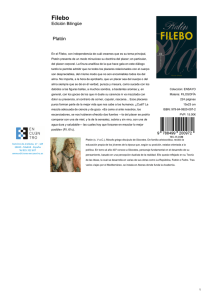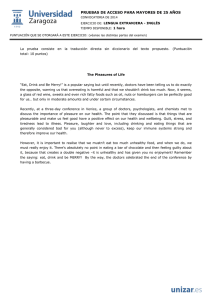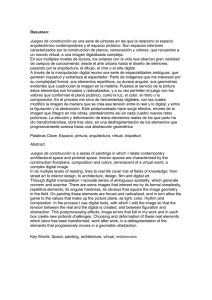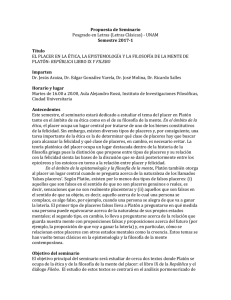Sobre el placer. Lectura del Filebo. Hedoné frente a Phrónesis. On
Anuncio
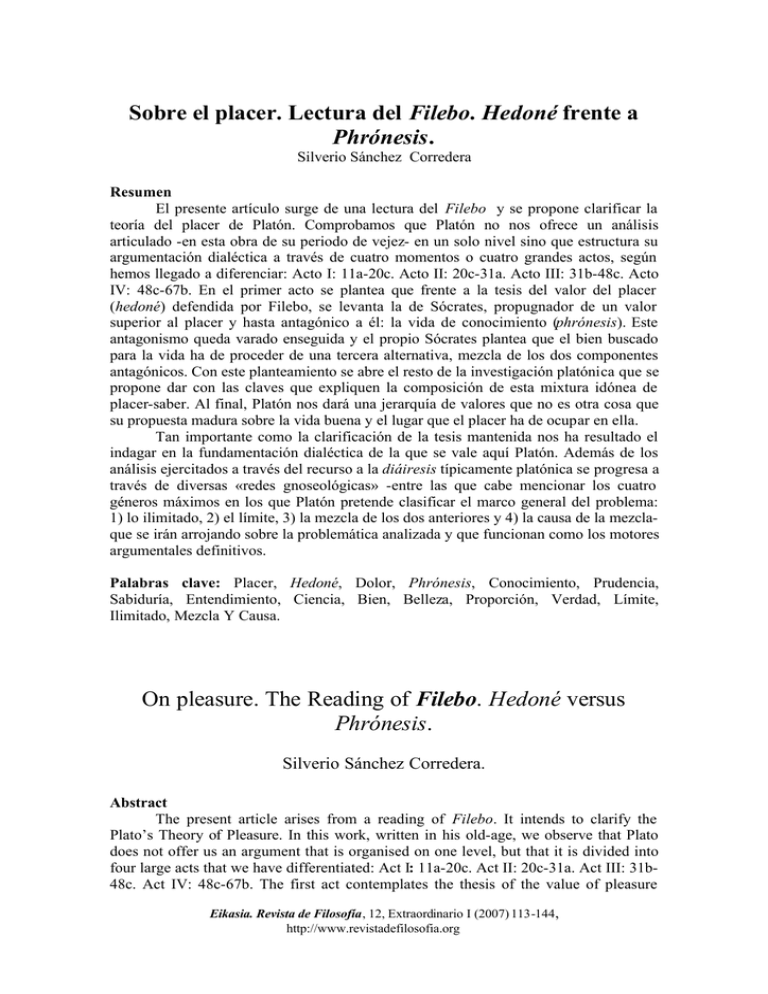
Sobre el placer. Lectura del Filebo. Hedoné frente a Phrónesis. Silverio Sánchez Corredera Resumen El presente artículo surge de una lectura del Filebo y se propone clarificar la teoría del placer de Platón. Comprobamos que Platón no nos ofrece un análisis articulado -en esta obra de su periodo de vejez- en un solo nivel sino que estructura su argumentación dialéctica a través de cuatro momentos o cuatro grandes actos, según hemos llegado a diferenciar: Acto I: 11a-20c. Acto II: 20c-31a. Acto III: 31b-48c. Acto IV: 48c-67b. En el primer acto se plantea que frente a la tesis del valor del placer (hedoné) defendida por Filebo, se levanta la de Sócrates, propugnador de un valor superior al placer y hasta antagónico a él: la vida de conocimiento (phrónesis). Este antagonismo queda varado enseguida y el propio Sócrates plantea que el bien buscado para la vida ha de proceder de una tercera alternativa, mezcla de los dos componentes antagónicos. Con este planteamiento se abre el resto de la investigación platónica que se propone dar con las claves que expliquen la composición de esta mixtura idónea de placer-saber. Al final, Platón nos dará una jerarquía de valores que no es otra cosa que su propuesta madura sobre la vida buena y el lugar que el placer ha de ocupar en ella. Tan importante como la clarificación de la tesis mantenida nos ha resultado el indagar en la fundamentación dialéctica de la que se vale aquí Platón. Además de los análisis ejercitados a través del recurso a la diáiresis típicamente platónica se progresa a través de diversas «redes gnoseológicas» -entre las que cabe mencionar los cuatro géneros máximos en los que Platón pretende clasificar el marco general del problema: 1) lo ilimitado, 2) el límite, 3) la mezcla de los dos anteriores y 4) la causa de la mezclaque se irán arrojando sobre la problemática analizada y que funcionan como los motores argumentales definitivos. Palabras clave: Placer, Hedoné, Dolor, Phrónesis, Conocimiento, Prudencia, Sabiduría, Entendimiento, Ciencia, Bien, Belleza, Proporción, Verdad, Límite, Ilimitado, Mezcla Y Causa. On pleasure. The Reading of Filebo. Hedoné versus Phrónesis. Silverio Sánchez Corredera. Abstract The present article arises from a reading of Filebo. It intends to clarify the Plato’s Theory of Pleasure. In this work, written in his old-age, we observe that Plato does not offer us an argument that is organised on one level, but that it is divided into four large acts that we have differentiated: Act I: 11a-20c. Act II: 20c-31a. Act III: 31b48c. Act IV: 48c-67b. The first act contemplates the thesis of the value of pleasure Eikasia. Revista de Filosofía, 12, Extraordinario I (2007) 113-144, http://www.revistadefilosofia.org (hedoné) against that of Socrates theory of “the life of knowledge”. Socrates believes in a value which is superior to that of pleasure, and at times is against it. This antagonism is quickly stopped and Socrates proposes that good searched for in life should come from a third alternative which is a combination of the two antagonistic components. This gives way to the keys that explain the composition of this combination of the ideal mixture of pleasure and knowledge. In the end, Plato gives us a hierarchy of values which is none other than his mature proposal about the good life and the place that pleasure should occupy in it. We consider the clarification of the thesis maintained as important as exploring the dialectical foundation on which Plato bases his argument. In addition to the analysis carried out through the resource to the typically platonic diáiresis, there is a progression through diverse gnoseologic nets -among which we can mention the four maximum genres that Plato classifies: 1) the unlimitted, 2) the limited, 3) the combination of the two, 4) the cause of the combination- that are added to the problem analysed and which works as the definitive argumentative motor. (Traducción de André Castillón Vezina) Key Words: Pleasure, Hedoné, Pain, Phrónesis, Knowledge, Wisdom Understanding, Science, Good, Beauty, Proportion, Truth, Limited, Unlimitted, Combinations, Cause. Eikasia. Revista de Filosofía, 12, Extraordinario I (2007) 113-144, http://www.revistadefilosofia.org
